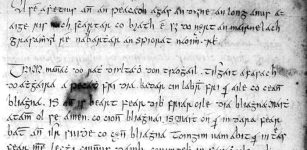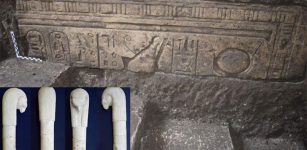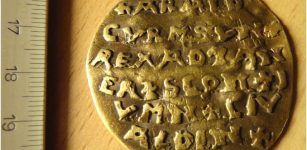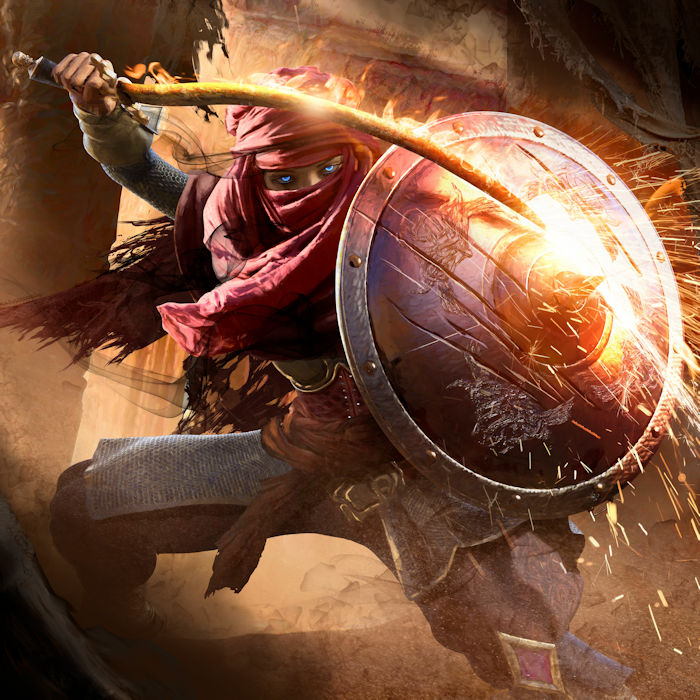Queen Mavia And The Tanukhids Launched A Massive Revolt Against Romans – But Why?
Ellen Lloyd - AncientPages.com - Why warrior queen Mavia launched a massive revolt against ancient Romans is a question a curious historian can ponder long and hard.
But one thing is certain, queen Mavia had no intention of accepting Romans’ terms, whose trademarks were exploitation and harassment of smaller and larger kingdoms. These activities were well-known in the region, and various rulers had objections.
Ancient Romans were naturally powerful and wealthy, but most of their riches came from conquering lands that could not easily defend themselves.
Credit: Adobe Stock - warmtail
Queen Mavia held peaceful relationships with benevolent kings and queens of neighboring kingdoms, but ancient Romans’ desire to spread across foreign territories to establish worldwide domination made them extremely unpopular.
So, one day queen Mavia said enough is enough and decided something must be done against the Romans. Finding allies was not particularly difficult because people of various tribes and kingdoms had just one target – the Roman Empire.
Who Was Queen Mavia?
Mavia (c. 375 - c. 425 CE) was a queen of the Tanukhids, a confederation of Araba tribes sometimes called the Saracens. These people emerged in northern Arabia and south of Syria in the 3rd century BC.
In the 4th century, the Tanukhids allied with Romans in the East and became foederati of Rome, which meant Romans provided them with benefits in exchange for military assistance.
According to this treaty, a kingdom was not obligated to continue providing the Roman Empire with services after the leader’s death.
The Tanukhids who helped defeat Queen Zenobia of Palmyra (c. 240 – c. 274 AD) were mostly Christians.
There is little information about Queen Mavia, but she is considered one of the most powerful women of ancient Arabia after Zenobia.
Historians are still trying to determine whether Queen Mavia was Christian from the beginning or became it only later.
What Caused Queen Mavia’s Revolt?
Shortly after the death of her husband al-Hawari, the last king of the semi-nomadic Tanukh, Queen Mavia revolted against the Romans. The cause of the revolt remains a subject discussed by historians.
It appears religious motives were behind the uprising. Roman emperor Valens refused the requests of the Arabs for an orthodox bishop. Instead, he wanted to send an Arian spiritual leader, which was unacceptable.
But how was this related to the actions undertaken by Queen Mavia? She left Aleppo with her people, went to the desert and forged alliances with various Arab tribes, and launched an attack on ancient Romans.
The most peculiar aspect of this story is that she was not a Christian then, or at least that is the conclusion some historians have reached. It is believed that during her military campaign, she met an ascetic monk who impressed her so much that she became an Orthodox Christian.
In 378 C.E., Queen Mavia and her warriors launched a furious attack on the Romans. Queen Mavia, who often led her army, used effective military tactics and fought guerrilla warfare.
She also utilized the mobility of their military units to conduct numerous raids. She also had the advantage that her warriors were familiar with Roman military tactics after having fought for the empire
Romans were unprepared for these fierce attacks of the Arabic queen and could not crush the revolt.
Many people supported Queen Mavia, who personally led her warriors into battle. She was a brave woman, a strong political leader, and an excellent commander. This meant warriors fully trusted her, and their war against the Romans succeeded.
As much as they may have disliked it, Romans capitulated to a woman, and this wasn’t the first time in their history.
Emperor Valens had no choice but to agree to peace and accept Queen Mavia’s terms. She had one particular wish. She told the Roman Empire she wanted Moses, the ascetic monk she had met earlier, to be ordained a bishop for her people.
She also sent her forces to help the Romans fight the Goths to show her goodwill and respect for the peace treaty.
Mavia, the fierce and determined Arabic warrior queen, died in Anasartha, east of Aleppo, in 425. She is today recognized as one of the most courageous ancient women in the history of Syria.
Updated on March 12, 2023
Written by Ellen Lloyd – AncientPages.com
Copyright © AncientPages.com All rights reserved. This material may not be published, broadcast, rewritten or redistributed in whole or part without the express written permission of AncientPages.com
More From Ancient Pages
-
 7,000-Year-Old Kilns From Ceramics Workshop Unearthed In Northeast Bulgaria
Archaeology | Nov 20, 2020
7,000-Year-Old Kilns From Ceramics Workshop Unearthed In Northeast Bulgaria
Archaeology | Nov 20, 2020 -
 Samurai Swords: Katana And Wakizashi And Their Long Tradition
Ancient Traditions And Customs | Aug 6, 2018
Samurai Swords: Katana And Wakizashi And Their Long Tradition
Ancient Traditions And Customs | Aug 6, 2018 -
 Is This The World’s Oldest Joke?
Featured Stories | Feb 21, 2014
Is This The World’s Oldest Joke?
Featured Stories | Feb 21, 2014 -
 Iktomi – Native American Spider-Trickster Spirit Whose Stories Teach Moral Values
Featured Stories | Jan 28, 2019
Iktomi – Native American Spider-Trickster Spirit Whose Stories Teach Moral Values
Featured Stories | Jan 28, 2019 -
 Japan’s Ancient Practice Of Cranial Modification: The Case Of The Hirota People In Tanegashima
Archaeology | Aug 18, 2023
Japan’s Ancient Practice Of Cranial Modification: The Case Of The Hirota People In Tanegashima
Archaeology | Aug 18, 2023 -
 Notre Dame Is On Fire! Can The Magnificent Cathedral Still Be Saved?
News | Apr 15, 2019
Notre Dame Is On Fire! Can The Magnificent Cathedral Still Be Saved?
News | Apr 15, 2019 -
 Teotihuacán: Enigmatic Birthplace Of The Gods And Its Obscure History
Civilizations | Jul 26, 2016
Teotihuacán: Enigmatic Birthplace Of The Gods And Its Obscure History
Civilizations | Jul 26, 2016 -
 Illuminati: Facts And History About The Secret Society
Featured Stories | Mar 30, 2017
Illuminati: Facts And History About The Secret Society
Featured Stories | Mar 30, 2017 -
 Ancient Tools Used In Religious Rituals In Honor Of Goddess Hathor Discovered In Egypt
Archaeology | Sep 27, 2021
Ancient Tools Used In Religious Rituals In Honor Of Goddess Hathor Discovered In Egypt
Archaeology | Sep 27, 2021 -
 Evidence Of A Hybrid Population Of Neanderthals And Modern Humans Discovered At La Cotte De St Brelade
Archaeology | Feb 9, 2021
Evidence Of A Hybrid Population Of Neanderthals And Modern Humans Discovered At La Cotte De St Brelade
Archaeology | Feb 9, 2021 -
 Celts In Poland: Iron Smelting Furnaces Used By Celts 2,400 Years Ago – Unearthed
Archaeology | Nov 30, 2019
Celts In Poland: Iron Smelting Furnaces Used By Celts 2,400 Years Ago – Unearthed
Archaeology | Nov 30, 2019 -
 Mysterious Golden Curmsun Disc And Its Connection To King Harald Bluetooth And The Legendary Jomsvikings
Artifacts | Apr 13, 2022
Mysterious Golden Curmsun Disc And Its Connection To King Harald Bluetooth And The Legendary Jomsvikings
Artifacts | Apr 13, 2022 -
 Mythical Helen Of Troy: Beautiful Wife Of King Menelaus Of Sparta
Featured Stories | Jul 5, 2019
Mythical Helen Of Troy: Beautiful Wife Of King Menelaus Of Sparta
Featured Stories | Jul 5, 2019 -
 Lost World Of Doggerland: Parts Of Britain’s Sunken Stone Age Atlantis Discovered
Archaeology | Jul 4, 2012
Lost World Of Doggerland: Parts Of Britain’s Sunken Stone Age Atlantis Discovered
Archaeology | Jul 4, 2012 -
 Ancient Egyptians Observed Algol’s Eclipses – Cairo Calendar Analyzed
Archaeology | Dec 19, 2015
Ancient Egyptians Observed Algol’s Eclipses – Cairo Calendar Analyzed
Archaeology | Dec 19, 2015 -
 Ancient Bronze Ring Bearing The Image Of St. Nicholas May Have Been Worn For Protection
Archaeology | Dec 28, 2021
Ancient Bronze Ring Bearing The Image Of St. Nicholas May Have Been Worn For Protection
Archaeology | Dec 28, 2021 -
 Who Was The Sapa Inca?
Featured Stories | Jul 29, 2024
Who Was The Sapa Inca?
Featured Stories | Jul 29, 2024 -
 Were The Knights Templar Guilty Or Innocent Of The Crimes Laid Against Them?
Featured Stories | Dec 24, 2020
Were The Knights Templar Guilty Or Innocent Of The Crimes Laid Against Them?
Featured Stories | Dec 24, 2020 -
 Long-Lost Ancient Tomb Of ‘China’s Shakespeare’ Finally Found
Archaeology | Aug 31, 2017
Long-Lost Ancient Tomb Of ‘China’s Shakespeare’ Finally Found
Archaeology | Aug 31, 2017 -
 Orthodox Church In Black Sea Region Looted By Treasure Hunters
Archaeology | Feb 24, 2021
Orthodox Church In Black Sea Region Looted By Treasure Hunters
Archaeology | Feb 24, 2021

